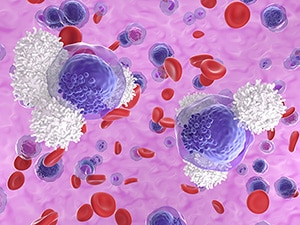Bispecific Antibody Indication Expanded for Acute Lymphoblastic Leukemia
The FDA approved the bispecific T-cell engager blinatumomab for use in the consolidation phase of therapy for certain patients with leukemia.
The U.S. Food and Drug Administration (FDA) has approved blinatumomab (Blincyto) for use in the consolidation phase of therapy in patients one month of age and older with CD19-positive, Philadelphia chromosome-negative (Ph-negative) B-cell precursor acute lymphoblastic leukemia (BCP-ALL).
Blinatumomab is an immunotherapy known as a bispecific T-cell engager that brings cancer cells and cancer-fighting T cells together so the latter can fight the former. Blinatumomab binds to the protein CD19 on leukemia cells and CD3 on T cells.
Blinatumomab was previously approved to treat CD19-positive BCP-ALL that did not respond to or relapsed following other therapies, or that entered a first or second complete remission but showed signs of minimal residual disease. The current approval allows blinatumomab to be given in the consolidation phase of therapy—which occurs after a complete remission to eradicate any residual cancer cells—regardless of minimal residual disease status.

This approval was based on results from two clinical trials: the randomized, controlled, phase III Study E1910 and the randomized, controlled, open-label, multicenter, phase III Study 20120215.
Study E1910 included 224 adult patients with Ph-negative BCP-ALL who, after induction and intensification therapy, were in complete remission with or without peripheral blood count recovery. Patients were randomly assigned 1:1 to receive blinatumomab followed by chemotherapy, or chemotherapy alone. In the blinatumomab arm, 84.8% of patients survived three years or longer, and 82.4% of patients survived five years or longer. In the chemotherapy arm, 69% and 62.5% of patients survived at least three and five years, respectively.
Study 20120215 randomly assigned 111 pediatric and young adult patients with Ph-negative BCP-ALL to receive blinatumomab or chemotherapy as their third cycle of consolidation therapy. In the blinatumomab arm, 78.4% of patients remained alive, and 61.1% of patients had not experienced disease progression, after five years. In the chemotherapy arm, 41.4% of patients remained alive, and 27.6% had not experienced disease progression, after five years.
The recommended dose of blinatumomab during consolidation therapy is 28 mcg per day for patients weighing 45 kg or more and is based on body surface area (15 mcg/m2 per day) for patients weighing less than 45 kg. During consolidation, blinatumomab is given as a 28-day continuous infusion, followed by a 14-day treatment-free period, for three cycles.
The prescribing information for blinatumomab contains a boxed warning for cytokine release syndrome and neurological toxicities.
Acute lymphoblastic leukemia (ALL) is a type of blood cancer that results from the overproduction of lymphocytes, a type of immune cell. BCP-ALL is caused by the overproduction of B cells, specifically. Around 50% of seniors, 80% of adults, and 95% of children with ALL have a Ph-negative form of the disease. According to federal statistics, it was estimated that 6,550 individuals would be diagnosed with ALL and 1,330 patients would die of the disease in the United States in 2024.
The FDA rendered its decision on June 14, 2024.
